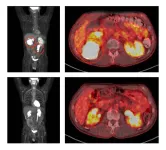(Press-News.org) Scientists have prototyped a new method for “rationally engineering” enzymes to deliver improved performance. They have devised an algorithm, which takes into account an enzyme’s evolutionary history, to flag where mutations could be introduced with a high likelihood of delivering functional improvements.
Their work – published today in leading journal Nature Communications – could have significant, wide-ranging impacts across a suite of industries, from food production to human health.
Enzymes are central to life and key to developing innovative drugs and tools to address society’s challenges. They have evolved over billions of years through changes in the amino acid sequence that underpins their 3D structure. Like beads on a string, each enzyme is composed of a sequence of several hundred amino acids that encodes its 3D shape.
With one of 20 amino acid ‘beads’ possible at each position, there is enormous sequence diversity possible in nature. Upon formation of their 3D shape, enzymes carry out a specific function such as digesting our dietary proteins, converting chemical energy into force in our muscles, and destroying bacteria or viruses that invade cells. If you change the sequence, you can disrupt the 3D shape, and that typically changes the functionality of the enzyme, sometimes rendering it completely ineffective.
Finding ways to improve the activity of enzymes would be hugely beneficial to many industrial applications and, using modern tools in molecular biology, it is simple and cost-efficient to engineer changes in the amino acid sequences to facilitate improvements in their performance. However, randomly introducing as little as three or four changes to the sequence can lead to a dramatic loss of their activity.
Here, the scientists report a promising new strategy to rationally engineer an enzyme called “beta-lactamase”. Instead of introducing random mutations in a scattergun approach, researchers at the Broad Institute and Harvard Medical School developed an algorithm that takes into account the evolutionary history of the enzyme.
“At the heart of this new algorithm is a scoring function that exploits thousands of sequences of beta-lactamase from many diverse organisms. Instead of a few random changes, up to 84 mutations over a sequence of 280 were generated to enhance functional performance,” said Dr Amir Khan, Associate Professor in Trinity College Dublin’s School of Biochemistry and Immunology, one of the co-authors of the research.
“And strikingly, the newly designed enzymes had both improved activity and stability at higher temperatures.”
Eve Napier, a second-year PhD student at Trinity College Dublin, determined the 3D experimental structure of a newly designed beta-lactamase, using a method called X-ray crystallography.
Her 3D map revealed that despite changes to 30% of the amino acids, the enzyme had an identical structure to the wild-type beta-lactamase. It also revealed how coordinated changes in amino acids, introduced simultaneously, can efficiently stabilise the 3D structure – in contrast to individual changes that typically impair the enzyme structure.
Eve Napier said: “Overall, these studies reveal that proteins can be engineered for improved activity by dramatic ‘jumps’ into new sequence space.
“The work has wide ranging applications in industry, in processes that require enzymes for food production, plastic-degrading enzymes, and those relevant to human health and disease, so we are quite excited for the future possibilities.”
END
A new paper in Biology Methods & Protocols, published by Oxford University Press, indicates that it may soon be possible for doctors to use artificial intelligence (AI) to detect and diagnose cancer in patients, allowing for earlier treatment. Cancer remains one of the most challenging human diseases, with over 19 million cases and 10 million deaths annually. The evolutionary nature of cancer makes it difficult to treat late-stage tumours.
Genetic information is encoded in DNA by patterns of the four bases—denoted by A, T, G and C—that make ...
In October 2018, Canada enacted the Cannabis Act in Canada (CAC), which legalised the non-medical use of cannabis. A new study has found that the rate of cannabis-related disorders diagnosed among pregnant women in the Canadian province of Québec increased by more than 20% after the enactment of the CAC, while rates for all other drug- and alcohol-related disorders remained stable. The study is published today in the scientific journal Addiction.
This study measured changes to the monthly rates of diagnosed cannabis-related disorders (CRDs) in the pregnant population in Québec. Since 2010 the monthly average number of CRDs has increased consistently, ...
Bottom Line: Cancer survivors who identify as lesbian, gay, bisexual, transgender, queer, or anything other than straight and cisgender (LGBTQ+) experience more chronic health conditions, disabilities, and other physical and cognitive limitations than non-LGBTQ+ cancer survivors; however, the prevalence of most conditions was highest among transgender or gender non-conforming (TGNC) individuals.
Journal in Which the Study was Published: Cancer Epidemiology, Biomarkers & Prevention, a journal of ...
A demonstration of how new technologies can be used in 21st century crop breeding comes from just published research that combines Laser Scanning and 3D printing to create a detailed 3D model of a sugar beet plant. Taking the next step beyond having genetic information to guide intelligent breeding, the 3D plant models here capture the essential characteristics of the above-ground parts of the sugar beet plant and can be used for AI-assisted crop improvement pipelines. The sugar beet plant models are reproducible and fit for field use. All the research information, data, methodology, as well as the 3D printing files are freely ...
The UK government’s failure to fortify all flour and rice with the vitamin folic acid “will result in more deaths and birth defects every year that could have been prevented,” argues Professor Sir Nicholas Wald in The BMJ today.
He warns that the current government’s proposal to fortify only one type of flour (non-wholemeal wheat flour) at an inadequate level will prevent only about 20% of neural tube defects, much less than the approximate 80% that could be prevented with fully effective fortification.
“What the government has done is a useful ...
Adults with a history of low back pain went nearly twice as long without a recurrence of their back pain if they walked regularly, a world-first study has found.
About 800 million people worldwide have low back pain, and it is a leading cause of disability and reduced quality of life.
Repeated episodes of low back pain are also very common, with seven in 10 people who recover from an episode going on to have a recurrence within a year.
Current best practice for back pain management and prevention suggests the combination of ...
KEY TAKEAWAYS
An international team, including researchers from Mass General Brigham, has been searching for protective genetic variants in a family that includes more than 1,000 individuals who are genetically predisposed to develop early onset Alzheimer’s disease in their 40s.
Previously, the researchers identified the “Christchurch variant” as potentially protective against Alzheimer’s based on one family member who had two copies of this variant and was expected to develop dementia in her ...
Embargoed for Release
Wednesday, June 19, 2024
5:00 p.m. ET Contact: NCI Press Office
240-760-6600
NCIPressOfficers@nih.gov
NOTE: A virtual briefing is scheduled for Tuesday, June 18, 2024, at 1:00 p.m. ET. Details below.
Researchers at the National Institutes of Health (NIH) have developed a non-chemotherapy treatment regimen that is achieving full remissions for some people with aggressive B-cell lymphoma that has come back or is no longer responding to standard treatments. The five-drug combination targets multiple molecular pathways that diffuse large B-cell lymphoma (DLBCL) tumors use to survive.
In ...
EMBARGOED FOR RELEASE UNTIL 4 P.M. ET, WEDNESDAY, JUNE 19, 2024
MINNEAPOLIS – Certain drugs used to treat urinary symptoms due to an enlarged prostate may be associated with a reduced risk of dementia with Lewy bodies, according to a study published in the June 19, 2024, online issue of Neurology®, the medical journal of the American Academy of Neurology. Dementia with Lewy bodies is a progressive neurodegenerative disorder that can cause memory and thinking issues, movement problems and issues such as hallucinations.
The results do not prove that these drugs reduce the risk of dementia ...
A new study suggests that certain drugs commonly used to treat enlarged prostate may also decrease the risk for dementia with Lewy bodies (DLB). This observational finding may seem surprising, but it mirrors previous work by the University of Iowa Health Care team that links the drugs to a protective effect in another neurodegenerative condition–Parkinson's disease.
The UI researchers think that a specific side effect of the drugs targets a biological flaw shared by DLB and Parkinson’s disease, as well as other neurodegenerative ...



